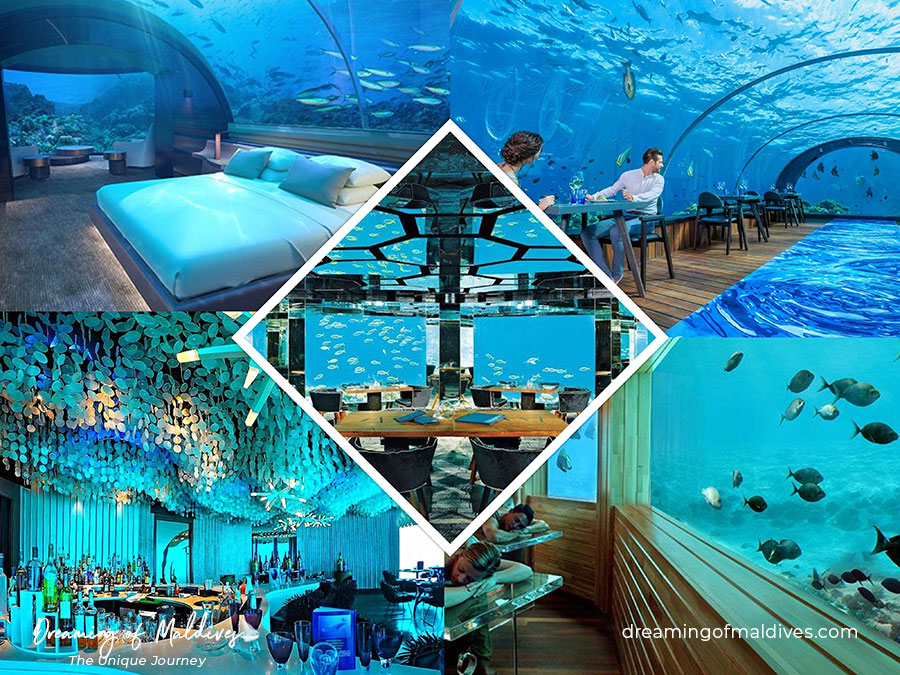Maldives Underwater Hotel: Imagine waking up to the vibrant colors of a coral reef, the gentle sway of ocean currents, and the mesmerizing dance of marine life right outside your window. This isn’t a fantasy; it’s the reality offered by the Maldives Underwater Hotel, a groundbreaking architectural marvel that seamlessly blends luxury, innovation, and sustainability. From its unique Murano glass design to its commitment to environmental responsibility, this underwater haven offers a truly unforgettable experience.
This incredible hotel isn’t just a place to stay; it’s a journey into a world rarely seen. The design, construction, and operation of this underwater paradise showcase cutting-edge technology and a deep respect for the delicate marine ecosystem it inhabits. We’ll explore everything from the luxurious amenities and unique dining experiences to the sustainable practices and technological innovations that make this hotel so special.
Murano Glass and Underwater Design
The Maldives Underwater Hotel boasts a unique design, heavily featuring Murano glass, renowned for its exquisite craftsmanship and vibrant colors. This choice isn’t merely aesthetic; it plays a crucial role in the overall guest experience and the structural integrity of the underwater habitat.
Murano Glass Design Elements
The hotel incorporates various Murano glass elements, from intricately designed panels forming the walls to bespoke lighting fixtures and decorative accents. The glass used is specifically engineered for underwater applications, possessing exceptional strength and clarity to withstand water pressure and maintain visibility. Unique designs, possibly incorporating swirling patterns or intricate mosaics, are likely employed to create a visually stunning and immersive underwater environment.
You also can investigate more thoroughly about matt rife before surgery to enhance your awareness in the field of matt rife before surgery.
The glass itself is likely thicker than typical architectural glass to withstand the immense pressure of the ocean depths.
Murano Glass and the Underwater Experience
The extensive use of Murano glass significantly enhances the underwater experience. The clarity of the glass provides unobstructed views of the vibrant coral reefs and marine life surrounding the hotel. The carefully chosen colors and designs of the glass panels contribute to a sense of spaciousness and luminosity within the underwater rooms, mitigating the potential claustrophobia of an underwater environment.
The interplay of light through the glass creates a dynamic and ever-changing visual spectacle.
Murano Glass in Architectural Projects
While Murano glass is famously used in Venetian architecture and high-end interior design, its application in underwater structures is less common. The Maldives Underwater Hotel represents a significant advancement in this area. Other notable underwater projects may use acrylic or other specialized materials, but the aesthetic and structural advantages of Murano glass make it a unique choice. The use of Murano glass in this context could be compared to its use in high-end aquariums, showcasing its ability to withstand water pressure while providing a visually stunning experience.
Challenges and Innovations in Underwater Murano Glass Integration
Integrating Murano glass into an underwater structure presented several challenges. The immense water pressure at depth required the development of specialized glass panels with significantly higher tensile strength than standard glass. Innovative techniques were likely employed to ensure the watertight sealing of the glass panels, preventing leaks and maintaining structural integrity. Precision engineering and meticulous craftsmanship were essential to ensure the successful installation and long-term durability of the glass elements.
This required collaboration between glass artisans, engineers, and underwater construction specialists.
Sustainability and Environmental Impact
The Maldives Underwater Hotel’s design and operation prioritize sustainability and minimizing environmental impact. This commitment extends from the selection of building materials to waste management and energy efficiency strategies.
Environmental Considerations in Design and Construction
The hotel’s design minimizes its footprint on the surrounding coral reef ecosystem. Sustainable building materials with low environmental impact were likely prioritized. The construction process aimed to avoid damage to the existing coral formations and marine life. Perhaps, the hotel’s foundation was designed to minimize disruption to the seabed, and the construction timeline was carefully planned to reduce the impact on the local environment.
Sustainable Practices Implemented
The hotel likely employs renewable energy sources such as solar power to reduce its reliance on fossil fuels. Water conservation measures, such as low-flow fixtures and water recycling systems, are likely implemented. The hotel likely sources food locally to reduce its carbon footprint associated with transportation. Furthermore, sustainable waste management practices and responsible sourcing of materials are likely incorporated.
Waste Management System
A comprehensive waste management system is crucial. Wastewater is likely treated before being released into the ocean, minimizing its impact on the marine environment. Solid waste is likely carefully sorted and disposed of responsibly, possibly through recycling and composting programs. The hotel likely works with local communities to manage waste effectively, reducing its environmental footprint.
Environmental Impact Compared to Overwater Bungalows
Compared to traditional overwater bungalows, the Maldives Underwater Hotel potentially has a smaller environmental footprint. Overwater bungalows often require extensive piling and construction that can damage the coral reefs. The underwater hotel’s design, if properly implemented, aims to minimize this impact. However, the energy consumption and waste generation of the hotel still needs to be carefully managed to ensure a net positive environmental impact.
Guest Experience and Amenities: Maldives Underwater Hotel
The Maldives Underwater Hotel offers a luxurious and unique guest experience, combining stunning underwater views with a range of high-end amenities and services.
Amenities and Services
Guests can expect luxurious accommodations with panoramic underwater views, private balconies or terraces, and personalized service. High-speed internet access, 24-hour room service, and concierge services are likely provided. A spa, fitness center, and perhaps a swimming pool (possibly with underwater views) may be available. The hotel likely offers multilingual staff to cater to international guests.
Unique Dining Experiences
The hotel likely offers unique dining experiences, perhaps with underwater restaurants offering panoramic views of the marine life. Special menus featuring fresh, locally sourced seafood are likely available. Private dining options and tailored culinary experiences may be offered to enhance the overall guest experience.
Activities and Excursions
Source: dreamingofmaldives.com
A variety of activities and excursions are offered. These are designed to complement the underwater theme and allow guests to fully immerse themselves in the Maldivian environment.
| Activity | Description | Duration | Price |
|---|---|---|---|
| Scuba Diving | Explore the vibrant coral reefs and diverse marine life. | 2-3 hours | $150-$250 |
| Snorkeling | Discover the underwater world at your own pace. | 1-2 hours | $75-$125 |
| Sunset Cruise | Enjoy breathtaking views of the Maldivian sunset. | 2 hours | $100 |
| Fishing Trip | Try your luck at catching local fish species. | 4 hours | $200 |
Typical Guest Day
A typical day might begin with a leisurely breakfast overlooking the ocean. Guests could then enjoy a morning of snorkeling or scuba diving, followed by lunch at the underwater restaurant. The afternoon might be spent relaxing by the pool or indulging in a spa treatment. An evening sunset cruise followed by a fine-dining experience could conclude the day.
The hotel likely offers flexible itineraries to accommodate individual preferences.
Technological Innovations
The Maldives Underwater Hotel incorporates cutting-edge technology to ensure the safety, comfort, and enjoyment of its guests while maintaining the structural integrity of the underwater structure.
Key Technological Innovations
The hotel’s construction likely involved advanced underwater engineering techniques and materials. Specialized pressure-resistant glass and advanced sealing technologies were likely employed. Sophisticated life support systems, including environmental controls for temperature and air quality, are essential. The hotel likely incorporates advanced monitoring systems to detect any potential structural issues or environmental changes.
Technology Enhancing Guest Experience and Safety
Technology enhances the guest experience through features like underwater viewing systems, interactive displays providing information about marine life, and personalized climate control in each room. Safety systems, including emergency escape routes and redundant life support systems, are crucial elements. The hotel likely has advanced communication systems to ensure seamless connectivity for guests and staff.
Technology Compared to Other Underwater Structures
Compared to other underwater structures, the Maldives Underwater Hotel likely employs more advanced materials and technologies. While other underwater habitats may exist, this hotel likely pushes the boundaries of underwater hospitality through its integration of luxury amenities and advanced technological systems. The scale and complexity of the project represent a significant leap forward in underwater construction and hospitality.
Infographic: Key Technological Components, Maldives Underwater Hotel
Pressure-resistant Glass: Specialized glass panels designed to withstand immense water pressure.
Advanced Sealing Technology: Ensures watertight seals to prevent leaks and maintain structural integrity.
Life Support Systems: Maintain optimal air quality, temperature, and pressure within the hotel.
Environmental Monitoring System: Continuously monitors water pressure, temperature, and other environmental factors.
Emergency Escape System: Provides safe evacuation routes in case of emergencies.
Communication Systems: Ensures reliable communication between guests, staff, and emergency services.
Marine Life and Coral Reef Ecosystem
The Maldives Underwater Hotel is situated within a rich and diverse marine ecosystem, teeming with vibrant coral reefs and an array of marine life. The hotel’s presence has potential impacts, both positive and negative, on this delicate environment.
Marine Life and Coral Reefs
The surrounding waters are home to a wide variety of colorful coral species, diverse fish populations (including reef fish, pelagic fish, and potentially even sharks and rays), and other marine invertebrates. The specific species present would depend on the exact location of the hotel, but the Maldives are known for their biodiversity.
Protecting the Marine Environment
The hotel likely employs various measures to protect and preserve the surrounding marine environment. These could include responsible waste management, minimizing disturbance to the coral reefs during construction and operation, and potentially participating in coral reef restoration projects. The hotel may also partner with local marine conservation organizations.
Observable Marine Organisms
Guests can observe a wide range of marine life from the hotel, including various species of colorful reef fish, corals of different shapes and sizes, sea turtles, and possibly larger marine animals like sharks or rays (depending on the location and visibility). The underwater environment visible from the hotel could provide a unique opportunity for marine life observation.
Impact of the Hotel’s Presence
The hotel’s presence could have both positive and negative impacts on the local marine life and coral reef ecosystem.
- Potential Positive Impacts: Increased awareness of marine conservation, funding for local conservation efforts, potential for research and monitoring of the local ecosystem.
- Potential Negative Impacts: Increased noise and light pollution, potential damage to coral reefs during construction, increased human traffic potentially disturbing marine life.
Closure
The Maldives Underwater Hotel isn’t just a hotel; it’s a testament to human ingenuity and our capacity to create extraordinary experiences while respecting the natural world. It’s a place where luxury meets sustainability, where innovation enhances the natural beauty of the surroundings, and where guests can connect with the ocean in a way never before imagined. From the breathtaking views to the commitment to environmental stewardship, this underwater sanctuary offers a truly unique and unforgettable escape.



